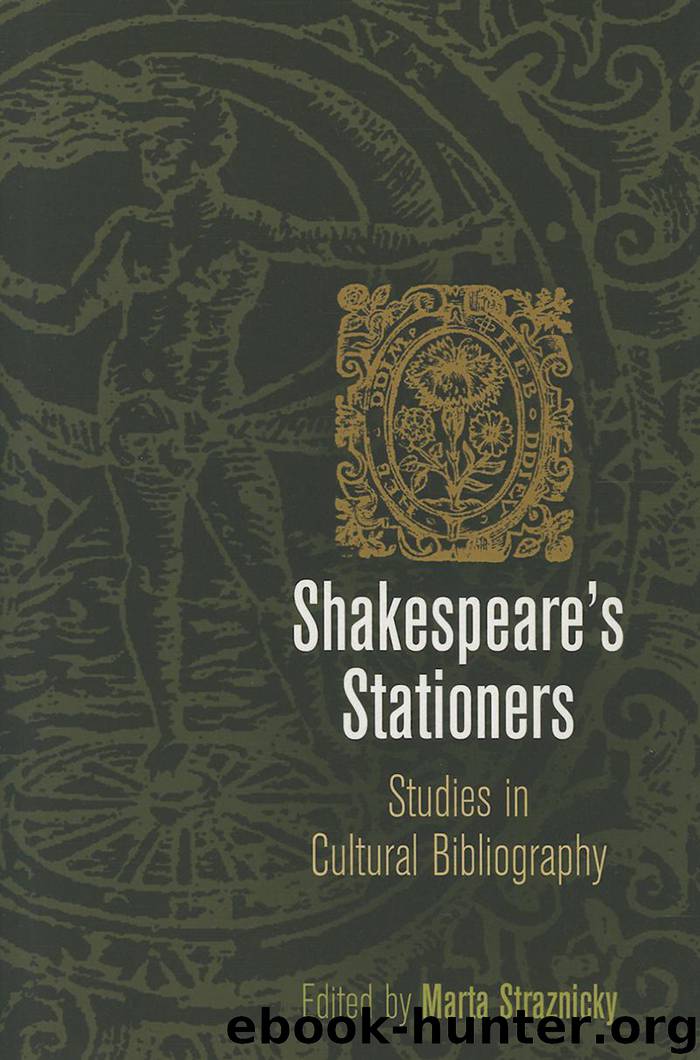Shakespeare's Stationers by Straznicky Marta;

Author:Straznicky, Marta;
Language: eng
Format: epub
Publisher: University of Pennsylvania Press
Published: 2013-09-29T16:00:00+00:00
John Norton and the Economics of Play Publication
The general impression of Norton that emerges is that of a printer who occupied an uncertain position on the margins of the Stationers’ Company and the London book trade. The best that might be said of his printing business is that it afforded him a “weake yet comfortable subsistence,” as he put it in his January 1636 petition to Laud. On the one hand, he may have occasionally benefited from his family connections, such as working in the King’s Printing House after his apprenticeship. He also seems to have profited from his marriage to Alice Law, which netted him a livery share in the English Stock and the rights to several profitable titles. On the other hand, his partnerships with Mathewes and Okes were marked more by acrimony and lawsuits than by mutually beneficial collaboration. He was accused (twice) of helping to erect a secret press with “disorderlie & factious persons,” one of whom was probably the “Arrant knave” Robert Raworth. He reportedly stole type from Okes, which was seized and melted by the Stationers’ Company. He and Okes bound more apprentices than they were allowed and hired an egregious number of non-Company journeymen to work in their shops. He had to mortgage his livery share in the English Stock twice, which might have been the result of financial troubles. He never managed to obtain a position as a master printer, though he was at least repeatedly allowed to continue operating his press. Having employed “his whole estate in the purchaseing of fit materials and requisits” for his print shop, he died heavily in debt.45 Clearly Norton was not a wealthy or powerful printer, and it is worth thinking about how his uncertain finances and peripheral position in the book trade might be connected to his publication of plays.
Norton was both one of the most active play printers and one of the most active play publishers in Caroline England, a curious fact that has not been remarked upon by historians of drama and the book trade. From 1624 until his death in 1640, he printed twenty-four editions of plays from the professional theater and another eight editions of nonprofessional drama, more than any other printer in this period besides his first partner, Augustine Mathewes.46 Norton also published eight editions of professional London plays and one of a provincial drama, THE VOW BREAKER. OR, THE FAIRE MAIDE of Clifton (1636, STC 21688), the title page of which claims it was performed in Nottingham by several companies. Only a few booksellers published a greater number of plays in this period.47
The specific plays published by Norton share certain characteristics that seem to fit the profile of a stationer looking to invest cautiously. Several features stand out in Table 1 below, which lists his play publications. Norton obtained the rights to four of these titles—the three Shakespeare history plays and How a Man May Choose a Good Wife from a Bad—from his father-in-law, Matthew Law. Each of these four plays, moreover, was among the very best-selling playbooks in early modern England.
Download
Shakespeare's Stationers by Straznicky Marta;.epub
This site does not store any files on its server. We only index and link to content provided by other sites. Please contact the content providers to delete copyright contents if any and email us, we'll remove relevant links or contents immediately.
Aircraft Design of WWII: A Sketchbook by Lockheed Aircraft Corporation(32120)
The Great Music City by Andrea Baker(30638)
Call Me by Your Name by André Aciman(19870)
The Art of Boudoir Photography: How to Create Stunning Photographs of Women by Christa Meola(18388)
The Secret History by Donna Tartt(18082)
Shoot Sexy by Ryan Armbrust(17535)
Plagued by Fire by Paul Hendrickson(17083)
Portrait Mastery in Black & White: Learn the Signature Style of a Legendary Photographer by Tim Kelly(16850)
Adobe Camera Raw For Digital Photographers Only by Rob Sheppard(16777)
Photographically Speaking: A Deeper Look at Creating Stronger Images (Eva Spring's Library) by David duChemin(16482)
Ready Player One by Cline Ernest(13926)
Pimp by Iceberg Slim(13717)
Bombshells: Glamour Girls of a Lifetime by Sullivan Steve(13665)
The Goal (Off-Campus #4) by Elle Kennedy(13175)
Art Nude Photography Explained: How to Photograph and Understand Great Art Nude Images by Simon Walden(12836)
Kathy Andrews Collection by Kathy Andrews(11289)
The Priory of the Orange Tree by Samantha Shannon(8532)
Thirteen Reasons Why by Jay Asher(8414)
The remains of the day by Kazuo Ishiguro(8349)
